Craig Cliff's Blog, page 27
August 10, 2011
Other Craigs / Daily Positive / Cigar Store Indians
Doubles
Out of the blue yesterday I received this email, sent via my Google Profile:
Not all Craigs are created equal
Okay something actually about me, or Status downgrade
I tempted fate, didn't I? Almost as soon as I posted my wee status report on THE NOVEL last week, things slowed down. I take some solace in that it was not all self-inflicted. My landlords are having a new bathroom put in our flat, which means a lot of sawing gib board and banging pipes outside my office door during my writing days at home. I have headphones and I should be disciplined enough to work through such a distraction. But the biggest problem was they turned the water off to do their plumbing business so I couldn't make a cup of tea or use the toilet, two crucial activities in my writing routine.
After battling through one unproductive day at home with the workmen, I decided to work the next day in a library. I chose to start the morning at Karori Library as it had free parking spaces nearby and opened half an hour earlier (9.30am) than the other libraries that day. I left the house before the bathroom men arrived (otherwise they'd block my car in with their vans) and this left me an hour and a half to explore before the library opened. What'd I do? Took photos of birds of course!
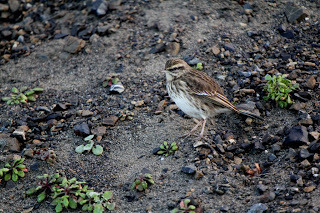
Pipit on Red Rocks Walkway
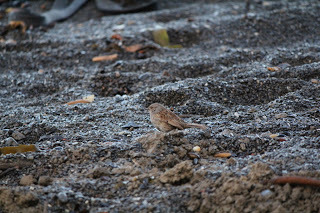
Dunnock (not a sparrow, note the narrower beak)
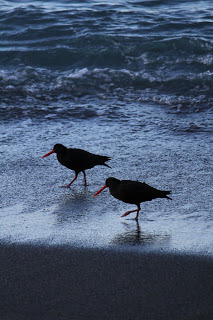
Oystercatchers, post coitus
(I have other pics, but I hope to keep this blog's G rating)
I got quite a bit of work done in the morning upstairs at Karori Library (no internet access for my old laptop is a blessing). After meeting Marisa in town for lunch, I tried Newtown library in the afternoon, but a lack of free parking or anywhere decent to set up my computer put the kibosh on writing there. Over the hill in Kilbirnie, however, I had more luck. Not quite as good a set up as Karori, but I did discover a great stash of NZ Memories magazines (great for research).
On Friday I tried Island Bay, but there was nowhere to set up, so I went back to Karori (with a birdy detour en route).
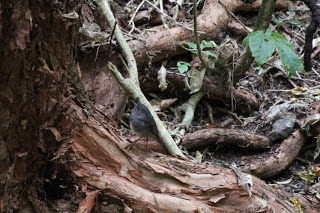
NZ Robin at the end of Holloway Road, Aro Valley
I spoke with the bathroom man today and it's going to be another week and half (3 weeks all up) before they're done. Karori here I come!
Something for Craig's Mom
I came across New Zealand's page on Daily Positive the other day, and was surprised to find I rate a mention:
Of course, there are some (some) of NZ's big moments on the list: NZ women getting the vote (Nov 28), Ed Hilliary and Tenzing Norgay reaching the summit of Everest (May 29), Alan McDiarmid winning the Nobel Prize (Oct 10), the All Blacks winning the 1987 Rugby World Cup (June 20).
I'm not one to meddle with wikis, but those who are of such persuasion shouldn't have to look far to find other significant dates that have been overlooked.
(My birthday is 10 January!)
Got a spare $150 bucks?
The trouble with doing a lot of research for THE NOVEL is you're never done. There's always some other source you should have consulted, some other aspect you never got and had to fudge, some book you wanted badly but couldn't justify the costs (even if tax-deductible).
 Today's book: The Shipcarvers' Art: Figureheads and Cigar-Store Indians in Nineteenth-Century America by Ralph Sessions. I can safely say this is the only book-length exploration of the link between ship carving and cigar store figures and it would yield very little in the way of my current novel, but I love books like this!
Today's book: The Shipcarvers' Art: Figureheads and Cigar-Store Indians in Nineteenth-Century America by Ralph Sessions. I can safely say this is the only book-length exploration of the link between ship carving and cigar store figures and it would yield very little in the way of my current novel, but I love books like this!
The Ministry of Magic
I've been sitting in a different building recently during my two days of paid work and a few people have come up to me in the kitchen to say, "I enjoy your column in the paper." It's nice to hear, but I wonder how much of this is down to the Ministry of Education connection? It must be interesting to have someone talking about the place you work (generally; remember this is a whole different building) in the midst of gardening tips, restaurant and book reviews and features about the dangers of sitting down (damn you Tom Fitzsimons, you've ruined my favourite pastime).
There are those at work who go beyond the "Love your work" comments and tell me what I should write about next. Most of it won't fly for a wider audience, though I'm sure it would thrill the Ministry-heads about town (and probably lead to my swift exit from the workforce). However, I am gathering enough Things People Say I Should Write A Column About to write a column about the things people tell me to write about. Phew, I need a breather after that sentence.
Real writing is rewriting, or Recent brainfarts detect while revising
'Right on queue'
'Moving sheik' (instead of 'moving chic')
'Phased' for 'fazed'
Of course, some brainfarts can be useful. Last week I misread the headline of a magazine article as 'Eeling for Daylight' when it actually said, 'Feeling for Daylight'... The image of trying to capture an elusive strand of daylight may just be something I can use one day.
Out of the blue yesterday I received this email, sent via my Google Profile:
I am a 62 y.o. Grandmother. I am sending you a note to tell you my Son's name is Craig Cliff. That doesn't seem like a common name. I will tell you that my son is an artist. He is older than you but I do notice similarities. We all agree that Craig [Redacted] Cliff can do anything. He is a musician and everyone says he can do everything. I'm a proud Mom and I bet your parents are very very proud of you. My Craig was born Sept. 5, 1973. Just had to communicate with you. Cheerio! [Redacted]
Not all Craigs are created equal
Okay something actually about me, or Status downgrade
I tempted fate, didn't I? Almost as soon as I posted my wee status report on THE NOVEL last week, things slowed down. I take some solace in that it was not all self-inflicted. My landlords are having a new bathroom put in our flat, which means a lot of sawing gib board and banging pipes outside my office door during my writing days at home. I have headphones and I should be disciplined enough to work through such a distraction. But the biggest problem was they turned the water off to do their plumbing business so I couldn't make a cup of tea or use the toilet, two crucial activities in my writing routine.
After battling through one unproductive day at home with the workmen, I decided to work the next day in a library. I chose to start the morning at Karori Library as it had free parking spaces nearby and opened half an hour earlier (9.30am) than the other libraries that day. I left the house before the bathroom men arrived (otherwise they'd block my car in with their vans) and this left me an hour and a half to explore before the library opened. What'd I do? Took photos of birds of course!

Pipit on Red Rocks Walkway

Dunnock (not a sparrow, note the narrower beak)

Oystercatchers, post coitus
(I have other pics, but I hope to keep this blog's G rating)
I got quite a bit of work done in the morning upstairs at Karori Library (no internet access for my old laptop is a blessing). After meeting Marisa in town for lunch, I tried Newtown library in the afternoon, but a lack of free parking or anywhere decent to set up my computer put the kibosh on writing there. Over the hill in Kilbirnie, however, I had more luck. Not quite as good a set up as Karori, but I did discover a great stash of NZ Memories magazines (great for research).
On Friday I tried Island Bay, but there was nowhere to set up, so I went back to Karori (with a birdy detour en route).

NZ Robin at the end of Holloway Road, Aro Valley
I spoke with the bathroom man today and it's going to be another week and half (3 weeks all up) before they're done. Karori here I come!
Something for Craig's Mom
I came across New Zealand's page on Daily Positive the other day, and was surprised to find I rate a mention:
May 21:I'm the only entry for May 21. In fact, there are only 18 entries total for New Zealand. And what a weird collection of trivia I'm a part of. The rediscovery of part of the pink and white terraces (Feb 2) (but not their initial destruction). Helen Clark recieves a Champion of the Earth award from UNEP (April 22). First sheep introduced to New Zealand (May 20). NZ launches first commercially viable biofuel (Aug 1).
Craig Cliff, short story and poetry writer from New Zealand, won the prestigious Commonwealth Writers' Prize 2011 in Overall Best First Book category for his book "A Man Melting". The winners of the 2011 Commonwealth Writers' Prize were announced on 21 May 2011 at The Sydney Writers' Festival in Sydney.[5]
Of course, there are some (some) of NZ's big moments on the list: NZ women getting the vote (Nov 28), Ed Hilliary and Tenzing Norgay reaching the summit of Everest (May 29), Alan McDiarmid winning the Nobel Prize (Oct 10), the All Blacks winning the 1987 Rugby World Cup (June 20).
I'm not one to meddle with wikis, but those who are of such persuasion shouldn't have to look far to find other significant dates that have been overlooked.
(My birthday is 10 January!)
Got a spare $150 bucks?
The trouble with doing a lot of research for THE NOVEL is you're never done. There's always some other source you should have consulted, some other aspect you never got and had to fudge, some book you wanted badly but couldn't justify the costs (even if tax-deductible).
 Today's book: The Shipcarvers' Art: Figureheads and Cigar-Store Indians in Nineteenth-Century America by Ralph Sessions. I can safely say this is the only book-length exploration of the link between ship carving and cigar store figures and it would yield very little in the way of my current novel, but I love books like this!
Today's book: The Shipcarvers' Art: Figureheads and Cigar-Store Indians in Nineteenth-Century America by Ralph Sessions. I can safely say this is the only book-length exploration of the link between ship carving and cigar store figures and it would yield very little in the way of my current novel, but I love books like this!The Ministry of Magic
I've been sitting in a different building recently during my two days of paid work and a few people have come up to me in the kitchen to say, "I enjoy your column in the paper." It's nice to hear, but I wonder how much of this is down to the Ministry of Education connection? It must be interesting to have someone talking about the place you work (generally; remember this is a whole different building) in the midst of gardening tips, restaurant and book reviews and features about the dangers of sitting down (damn you Tom Fitzsimons, you've ruined my favourite pastime).
There are those at work who go beyond the "Love your work" comments and tell me what I should write about next. Most of it won't fly for a wider audience, though I'm sure it would thrill the Ministry-heads about town (and probably lead to my swift exit from the workforce). However, I am gathering enough Things People Say I Should Write A Column About to write a column about the things people tell me to write about. Phew, I need a breather after that sentence.
Real writing is rewriting, or Recent brainfarts detect while revising
'Right on queue'
'Moving sheik' (instead of 'moving chic')
'Phased' for 'fazed'
Of course, some brainfarts can be useful. Last week I misread the headline of a magazine article as 'Eeling for Daylight' when it actually said, 'Feeling for Daylight'... The image of trying to capture an elusive strand of daylight may just be something I can use one day.
Published on August 10, 2011 01:43
August 8, 2011
Settlers Creek and The Larnachs
Preamble: My first book review for money is published in the New Zealand Listener this week so I feel compelled to spell out that what follows in not a freebie review. This is a freebie blog post. Just me, as a writer and blogger, keen to capture my response to certain books and aspects of those books as I go about my own fiction.
*Settlers Creek by Carl Nixon
The Larnachs by Owen Marshall


This is brave territory for any writer to wade into, and I think Nixon is able to present his personal-versus-cultural conflict in a powerful way. The protagonist, Box Saxton (*name cringe*), is presented in such a way that it's hard to view any of his actions as racially motivated. He is powered by a very personal sense of what is right (and it should not be forgotten he is acting under the duress of sudden grief and hardship).
In the later stages of the novel, however, there are walk-ons for a couple of characters who are allowed to air their dodgy views. Again, these views are rebutted by Box, both overtly (he denies his effort to retrieve his son has anything to do with 'sticking it to the Maoris') and by the general positioning of the narrative itself.
However, I think this book fails to be truly enlightening because it remains wedded to one perspective. It's clear that, in the rare glimpses into the world of Tipene and his whanau, Nixon knows more about Maori taonga than his protagonist, and yet it is quite something else to ask a pakeha novelist to present both pakeha and Maori perspectives with equal weight in the novel. But if I am to applaud Nixon's bravery for tackling a tricky issue, I must also point out that he could and should have gone further.
 Politics in fiction is not about National versus Labour (even in a roman a clef like Charlotte Grimshaw's The Night Book). So often it comes down to narrative structure and perspective: who is given a voice and who is shut out. There are a number of novels that deal with this kind of narrative politics directly -- J.M. Coetzee's Foe, for example, which give voice to the woman excluded from Daniel DeFoe's Robinson Crusoe story, while keeping the silence of the black Man Friday (his tongue is cut out) -- though these books tend to be good for little more than dissection in undergraduate EngLit courses.
Politics in fiction is not about National versus Labour (even in a roman a clef like Charlotte Grimshaw's The Night Book). So often it comes down to narrative structure and perspective: who is given a voice and who is shut out. There are a number of novels that deal with this kind of narrative politics directly -- J.M. Coetzee's Foe, for example, which give voice to the woman excluded from Daniel DeFoe's Robinson Crusoe story, while keeping the silence of the black Man Friday (his tongue is cut out) -- though these books tend to be good for little more than dissection in undergraduate EngLit courses.
Settlers Creek hammers home the point that European settlers can have strong and valid connections with the land and that one culture should not overrule another simply by default. The book's blurb might invite debate, but the book itself does not provide a forum for this debate. It feels instead like the Wizard of Christchurch holding forth in Cathedral Square: a one-sided diatribe that is superficially entertaining but hardly convincing, a spectacle that is somehow detached from reality. Settlers Creek feels quaint and nostalgic (speaking to a world where men in bush shirts communed with nature and didn't know two words of te reo); though it is set in the present and rife with personal turmoil, it's impact remains limited to one person when it might have been about two people (pun intended, somewhat uncomfortably).
The Larnachs by Owen Marshall is, in this respect, the inverse of Settlers Creek. It is set in the past and yet, by virtue of its narrative politics, it feels the more immediate and comprehensive book.
The narration is handled in turn-about fashion, with Conny taking chapter 1, Dougie chapter 2, Conny chapter 3 and so on. Dougie's chapters follow Conny's but deal with the same time period as described in the previous chapter: in this way the reader is often given two perspectives on certain events, and always two perspectives on the relationship that is developing.
This is a marvellously written book. Marshall's fiction has often employed a formal register, though this is his first attempt at an historical novel. The delight he has taken in the polished grammar of this bygone era is evident. I often read a sentence and paused to imagine Owen Marshall leaning back on his office chair, grinning, having just crafted it.
Similarly, there is mastery at work with the depiction of time and place through the deployment of historic details: Conny's respect for the writer Margaret Oliphant and sadness when she dies; the buggy rides from Dunedin to The Camp; the evenings spent with Seddon and Ward in Wellington which inevitably end with all gathered around the piano.
 Despite the appearance of many figures and event which are still notable in our 2011 sense of NZ history, this book does not succumb to the "Shanghai Knights effect" (see here for an explanation of this common failing of historical novels). Larnach was a big player in colonial politics and banking and it seems only right that he (and Conny and Dougie) rub shoulders with the movers and shakers of their time. It also works when the Larnachs see Mark Twain's lecture as he toured New Zealand in 1896, because it is believable people of their standing in Dunedin would have attended, and nothing pivotal hangs on this outing. Compare this to the fear that Boden Black's mother has died in the Tangiwai disaster in The Hut Builder or his chance meeting with Sir Edmund Hillary later on in the novel. The presence of well-known people is part of the texture of Marshall's novel, rather than the nodes around which the narrative is constructed.
Despite the appearance of many figures and event which are still notable in our 2011 sense of NZ history, this book does not succumb to the "Shanghai Knights effect" (see here for an explanation of this common failing of historical novels). Larnach was a big player in colonial politics and banking and it seems only right that he (and Conny and Dougie) rub shoulders with the movers and shakers of their time. It also works when the Larnachs see Mark Twain's lecture as he toured New Zealand in 1896, because it is believable people of their standing in Dunedin would have attended, and nothing pivotal hangs on this outing. Compare this to the fear that Boden Black's mother has died in the Tangiwai disaster in The Hut Builder or his chance meeting with Sir Edmund Hillary later on in the novel. The presence of well-known people is part of the texture of Marshall's novel, rather than the nodes around which the narrative is constructed.
However, while the choice of the two-handed, turn-about narration gives us a nuanced, multi-faceted view of the Conny-Dougie relationship (and also does a good job of painting the apex of the love triangle, Daddy Lanarch), there are down-sides.
While each chapter roams around the narrator's recent past, the narrative only moves forward in time every two chapters. As such, much of the novel feels static. There are very few scenes, in the traditional sense, and hardly any direct speech. In place of dramatic action, pages are given over to musings of the narrator, which, however well written, tend to drag after a while.
And, despite the laudable narrative politics displayed by the structure of the novel -- giving voice to the two members of the rumoured love triangle for whom we have only had rumour -- there is something disingenuous about how Conny and Dougie tell their tale. What exactly are these chapters? There is a distinct epistemological feel, but each character lays bare their innermost secrets -- discussing their love for the other before making their first moves; describing their sexual encouters -- that they'd never write in a letter to another person, not even to each other. Nor would they risk writing it down in a journal. Besides, what would prompt each to set down the events of the last few months or years at the same point in time?
So who is the audience?
Hold that thought.
Each chapter bears the outward appearance of a discrete, individual narration. That is, Dougie is not aware of the thoughts Conny has expressed in the previous chapter. However, on closer inspection, there is clearly another force mediating what each narrator tells us and how. For example, Conny explains in detail William Larnach's installation of a telephone exchange at The Camp and how he makes Dougie man the exchange when he'd rather be out inspecting the Alderney herd. Then, in the following chapter, Dougie mentions the exchange in passing without glossing it for his interlocutor, whomever they may be. Of course the reader knows about the exchange already, but how does Dougie know we know? Same goes with the buggy incident at Anderson's Bay, and a dozen other events or details.
So who is the audience of these chapters? It's all for you, dear reader. It is the novelist's hand you see again, intruding here and there to ensure the chapters serve the greater narrative rather than being hermetically-sealed monologues delivered to the ether.
Marshall is conducting the séance. His talent with pulleys and magnets is often, but not always, enough to overlook the fact he's moving the Ouija board to his own ends.
Two more quibbles (and lets keep things in perspective here, this is a fantastic book, and quibbles < qualms < objections):
One: Conny dominates Dougie if we are to truly examine the equality of the narrative politics. Her chapters come first and are longer (often by virtue of Dougie not having to explain so much about what has been happening).
Neither character is that likeable (when are starcrossed lovers ever likeable?) but Conny is the more intriguing: an intelligent, strong-willed suffragette who discovers love with Dougie after marrying William for other reasons. Dougie is simpler, earthier and more insufferable. Whether it's due to Marshall's innate preference or design, it's a good thing we readers spend less time with Dougie. But is it fair to him? Not really.
Two: Their voices are often indistinguishable. There are brief moments when Dougie resorts to earthier vernacular, but both narrators generally speak the same mannered 1890s dialect and both are prone to Marshallian aphorisms. Don't get me wrong, one of the reasons I read Marshall's work is for these aphorisms (it's one of the things that separates his books from the likes of Settlers Creek).
I noted down a number of these pronouncements as I read...
The problem is I cannot instantly identify which of the two narrators said the above (apart from the last one).
Again, the writer's hand is showing, if only slightly.
But what do I want, really? How could Marshall have repeated the telling of the Anderson's Bay buggy incident in full from Dougie's perspective without boring the reader? How could he resist the urge to say something as neat and poignant as 'Like you young princes, we accepted it all as our entitlement,' just because Dougie was talking at the time? To fix one problem would surely have created another.
I said Nixon was brave to wade into the subject matter of Settlers Creek, and I must be even handed and point out the bravery at work in Marshall tackling historical fiction based on the lives of real figures. He comes close to the rocks of romantic (historic) fiction at times, but manages to avoid catastrophe because of the very structure I have nitpicked. The Larnachs is not so much the story of an affair as the anatomy of one. Spending time with these narrators is less about vicarious thrills and more about dissecting motives and actions in order to understand the human animal.
No narrative choice is perfect and there is no such thing as perfect narrative politics. There must be winners and losers, gaps and deficiencies, in every novel. The fact remains, however, that some novels are fairer-handed, fuller and closer to perfection than others.
*Settlers Creek by Carl Nixon
The Larnachs by Owen Marshall


Settlers Creek, the blurb: Box Saxton just wants to bury his teenage stepson's body in the churchyard near the farm where Box grew up. What happens, though, when the boy's biological father, a Maori leader, unexpectedly turns up in the days before the funeral and forcibly takes the boy's body? According to Maori custom the boy must be buried in the tribe's ancestral cemetery at the small coastal town of Kaipuna. According to the law there is very little Box can do. With no plan and little hope, Box gets in his old truck and drives north, desperate and heartbroken. Settler's Creek explores the claims of both indigenous people and more recent settlers to have a spiritual link to the land.
This is brave territory for any writer to wade into, and I think Nixon is able to present his personal-versus-cultural conflict in a powerful way. The protagonist, Box Saxton (*name cringe*), is presented in such a way that it's hard to view any of his actions as racially motivated. He is powered by a very personal sense of what is right (and it should not be forgotten he is acting under the duress of sudden grief and hardship).
In the later stages of the novel, however, there are walk-ons for a couple of characters who are allowed to air their dodgy views. Again, these views are rebutted by Box, both overtly (he denies his effort to retrieve his son has anything to do with 'sticking it to the Maoris') and by the general positioning of the narrative itself.
However, I think this book fails to be truly enlightening because it remains wedded to one perspective. It's clear that, in the rare glimpses into the world of Tipene and his whanau, Nixon knows more about Maori taonga than his protagonist, and yet it is quite something else to ask a pakeha novelist to present both pakeha and Maori perspectives with equal weight in the novel. But if I am to applaud Nixon's bravery for tackling a tricky issue, I must also point out that he could and should have gone further.
 Politics in fiction is not about National versus Labour (even in a roman a clef like Charlotte Grimshaw's The Night Book). So often it comes down to narrative structure and perspective: who is given a voice and who is shut out. There are a number of novels that deal with this kind of narrative politics directly -- J.M. Coetzee's Foe, for example, which give voice to the woman excluded from Daniel DeFoe's Robinson Crusoe story, while keeping the silence of the black Man Friday (his tongue is cut out) -- though these books tend to be good for little more than dissection in undergraduate EngLit courses.
Politics in fiction is not about National versus Labour (even in a roman a clef like Charlotte Grimshaw's The Night Book). So often it comes down to narrative structure and perspective: who is given a voice and who is shut out. There are a number of novels that deal with this kind of narrative politics directly -- J.M. Coetzee's Foe, for example, which give voice to the woman excluded from Daniel DeFoe's Robinson Crusoe story, while keeping the silence of the black Man Friday (his tongue is cut out) -- though these books tend to be good for little more than dissection in undergraduate EngLit courses.Settlers Creek hammers home the point that European settlers can have strong and valid connections with the land and that one culture should not overrule another simply by default. The book's blurb might invite debate, but the book itself does not provide a forum for this debate. It feels instead like the Wizard of Christchurch holding forth in Cathedral Square: a one-sided diatribe that is superficially entertaining but hardly convincing, a spectacle that is somehow detached from reality. Settlers Creek feels quaint and nostalgic (speaking to a world where men in bush shirts communed with nature and didn't know two words of te reo); though it is set in the present and rife with personal turmoil, it's impact remains limited to one person when it might have been about two people (pun intended, somewhat uncomfortably).
The Larnachs by Owen Marshall is, in this respect, the inverse of Settlers Creek. It is set in the past and yet, by virtue of its narrative politics, it feels the more immediate and comprehensive book.
The blurb: In 1891, after the death of his first two wives, William Larnach married the much younger Constance de Bathe Brandon. But the marriage that began with such happiness was to end in tragedy. The story of the growing relationship between Conny and William's younger son, Dougie, lies at the heart of Owen Marshall's subtle and compelling new novel. The socially restrictive world of late nineteenth-century Dunedin and Wellington springs vividly to life as Marshall traces the deepening love between stepmother and stepson, and the slow disintegration of the domineering yet vulnerable figure of Larnach himself. Can love ever really be its own world, free of morality and judgement and scandal?Marshall takes two verifiable facts as his start and end points: the marriage of Larnarch and Conny in 1891 and Larnach's dramatic suicide in 1898. There were rumours about an affair between Connie and Dougie at the time, but with rather less fact to go on Marshall is given the freedom to explore this relationship imaginatively.
The narration is handled in turn-about fashion, with Conny taking chapter 1, Dougie chapter 2, Conny chapter 3 and so on. Dougie's chapters follow Conny's but deal with the same time period as described in the previous chapter: in this way the reader is often given two perspectives on certain events, and always two perspectives on the relationship that is developing.
This is a marvellously written book. Marshall's fiction has often employed a formal register, though this is his first attempt at an historical novel. The delight he has taken in the polished grammar of this bygone era is evident. I often read a sentence and paused to imagine Owen Marshall leaning back on his office chair, grinning, having just crafted it.
Similarly, there is mastery at work with the depiction of time and place through the deployment of historic details: Conny's respect for the writer Margaret Oliphant and sadness when she dies; the buggy rides from Dunedin to The Camp; the evenings spent with Seddon and Ward in Wellington which inevitably end with all gathered around the piano.
 Despite the appearance of many figures and event which are still notable in our 2011 sense of NZ history, this book does not succumb to the "Shanghai Knights effect" (see here for an explanation of this common failing of historical novels). Larnach was a big player in colonial politics and banking and it seems only right that he (and Conny and Dougie) rub shoulders with the movers and shakers of their time. It also works when the Larnachs see Mark Twain's lecture as he toured New Zealand in 1896, because it is believable people of their standing in Dunedin would have attended, and nothing pivotal hangs on this outing. Compare this to the fear that Boden Black's mother has died in the Tangiwai disaster in The Hut Builder or his chance meeting with Sir Edmund Hillary later on in the novel. The presence of well-known people is part of the texture of Marshall's novel, rather than the nodes around which the narrative is constructed.
Despite the appearance of many figures and event which are still notable in our 2011 sense of NZ history, this book does not succumb to the "Shanghai Knights effect" (see here for an explanation of this common failing of historical novels). Larnach was a big player in colonial politics and banking and it seems only right that he (and Conny and Dougie) rub shoulders with the movers and shakers of their time. It also works when the Larnachs see Mark Twain's lecture as he toured New Zealand in 1896, because it is believable people of their standing in Dunedin would have attended, and nothing pivotal hangs on this outing. Compare this to the fear that Boden Black's mother has died in the Tangiwai disaster in The Hut Builder or his chance meeting with Sir Edmund Hillary later on in the novel. The presence of well-known people is part of the texture of Marshall's novel, rather than the nodes around which the narrative is constructed.However, while the choice of the two-handed, turn-about narration gives us a nuanced, multi-faceted view of the Conny-Dougie relationship (and also does a good job of painting the apex of the love triangle, Daddy Lanarch), there are down-sides.
While each chapter roams around the narrator's recent past, the narrative only moves forward in time every two chapters. As such, much of the novel feels static. There are very few scenes, in the traditional sense, and hardly any direct speech. In place of dramatic action, pages are given over to musings of the narrator, which, however well written, tend to drag after a while.
And, despite the laudable narrative politics displayed by the structure of the novel -- giving voice to the two members of the rumoured love triangle for whom we have only had rumour -- there is something disingenuous about how Conny and Dougie tell their tale. What exactly are these chapters? There is a distinct epistemological feel, but each character lays bare their innermost secrets -- discussing their love for the other before making their first moves; describing their sexual encouters -- that they'd never write in a letter to another person, not even to each other. Nor would they risk writing it down in a journal. Besides, what would prompt each to set down the events of the last few months or years at the same point in time?
So who is the audience?
Hold that thought.
Each chapter bears the outward appearance of a discrete, individual narration. That is, Dougie is not aware of the thoughts Conny has expressed in the previous chapter. However, on closer inspection, there is clearly another force mediating what each narrator tells us and how. For example, Conny explains in detail William Larnach's installation of a telephone exchange at The Camp and how he makes Dougie man the exchange when he'd rather be out inspecting the Alderney herd. Then, in the following chapter, Dougie mentions the exchange in passing without glossing it for his interlocutor, whomever they may be. Of course the reader knows about the exchange already, but how does Dougie know we know? Same goes with the buggy incident at Anderson's Bay, and a dozen other events or details.
So who is the audience of these chapters? It's all for you, dear reader. It is the novelist's hand you see again, intruding here and there to ensure the chapters serve the greater narrative rather than being hermetically-sealed monologues delivered to the ether.
Marshall is conducting the séance. His talent with pulleys and magnets is often, but not always, enough to overlook the fact he's moving the Ouija board to his own ends.
Two more quibbles (and lets keep things in perspective here, this is a fantastic book, and quibbles < qualms < objections):
One: Conny dominates Dougie if we are to truly examine the equality of the narrative politics. Her chapters come first and are longer (often by virtue of Dougie not having to explain so much about what has been happening).
Neither character is that likeable (when are starcrossed lovers ever likeable?) but Conny is the more intriguing: an intelligent, strong-willed suffragette who discovers love with Dougie after marrying William for other reasons. Dougie is simpler, earthier and more insufferable. Whether it's due to Marshall's innate preference or design, it's a good thing we readers spend less time with Dougie. But is it fair to him? Not really.
Two: Their voices are often indistinguishable. There are brief moments when Dougie resorts to earthier vernacular, but both narrators generally speak the same mannered 1890s dialect and both are prone to Marshallian aphorisms. Don't get me wrong, one of the reasons I read Marshall's work is for these aphorisms (it's one of the things that separates his books from the likes of Settlers Creek).
I noted down a number of these pronouncements as I read...
'How multifarious life is, and yet we assume our own activities and feelings to be the sum of it.'
'The best and worst of human behaviour can be so close together.'
'All that's long gone, but memory is beyond conscious control. We can't choose our past, or ever quite bury it.'
'Strange in a way, for otherwise I would not wish to spend much time in Brisbane. It is a thrusting, practical place that still bears much evidence of its origins...'
'Every day marks some cataclysm for people somewhere in the world, yet presents a benign countenance to all the others.'
'Life often means a strange, almost comic, loss of dignity, but what the hell.'
The problem is I cannot instantly identify which of the two narrators said the above (apart from the last one).
Again, the writer's hand is showing, if only slightly.
But what do I want, really? How could Marshall have repeated the telling of the Anderson's Bay buggy incident in full from Dougie's perspective without boring the reader? How could he resist the urge to say something as neat and poignant as 'Like you young princes, we accepted it all as our entitlement,' just because Dougie was talking at the time? To fix one problem would surely have created another.
I said Nixon was brave to wade into the subject matter of Settlers Creek, and I must be even handed and point out the bravery at work in Marshall tackling historical fiction based on the lives of real figures. He comes close to the rocks of romantic (historic) fiction at times, but manages to avoid catastrophe because of the very structure I have nitpicked. The Larnachs is not so much the story of an affair as the anatomy of one. Spending time with these narrators is less about vicarious thrills and more about dissecting motives and actions in order to understand the human animal.
No narrative choice is perfect and there is no such thing as perfect narrative politics. There must be winners and losers, gaps and deficiencies, in every novel. The fact remains, however, that some novels are fairer-handed, fuller and closer to perfection than others.
Published on August 08, 2011 01:54
August 1, 2011
Pasture / Bruce Cockburn / Status Report / Melbourne
Out to pasture
[image error]
I have quite a few poems and micro-stories appearing in the brand spanking new, hardback literary journal, Pasture , which is out this month. Pasture is the sister journal to Starch which started earlier in the year. All of Kilmog Press's books are gorgeous specimens and I'm looking forward to my copy of Pasture no.1 arriving in the mailbox (and reading the work by the other contributors, such as Elizabeth Smither, Karen Zelas and Helen Rickerby, naturally).
Tuesday Earworm
Not quite the year of a million words
I gave my editor a status report on THE NOVEL today. In the interests of sticking to the intent of this blog to open the door every now and then on the creative process AND not wasting too much time blogging when I should be working on THE NOVEL, I hereby cut and paste portions of my status update for the world to see (and hold against me when I miss my deadlines):
I don't intend to write any more short stories in the next three months, so there are 6,000 more words that can be transferred to novel-writing per month. Keeping up a pace of 18,000 words a month for three months would seem achievable.
Excuse me while I knock on every piece of wood in my flat…
Speaking of Melbourne
The programme/program is now online for the Melbourne Writers Festival. I'm doing
 There are some big names slated to appear in Melbourne, the biggest perhaps being
There are some big names slated to appear in Melbourne, the biggest perhaps being
There's also a syndicate of big name crime writers -
[image error]
I have quite a few poems and micro-stories appearing in the brand spanking new, hardback literary journal, Pasture , which is out this month. Pasture is the sister journal to Starch which started earlier in the year. All of Kilmog Press's books are gorgeous specimens and I'm looking forward to my copy of Pasture no.1 arriving in the mailbox (and reading the work by the other contributors, such as Elizabeth Smither, Karen Zelas and Helen Rickerby, naturally).
Tuesday Earworm
Not quite the year of a million words
I gave my editor a status report on THE NOVEL today. In the interests of sticking to the intent of this blog to open the door every now and then on the creative process AND not wasting too much time blogging when I should be working on THE NOVEL, I hereby cut and paste portions of my status update for the world to see (and hold against me when I miss my deadlines):
Things are going reasonably well.Bonus content for blog readers: In July I wrote 12,000 words on the novel. In addition to this I wrote a 6,000 story (from scratch to submission) set in the present day (my helicopter story); three columns for the Dominion Post; a fifteen minute speech about basketball and fiction for Brooklyn School's appetites evening; and wrote and/or revised several poems.
Early on I had a bit of trouble finding a way to incorporate a modern voice / perspective into what is, on the face of it, an historical account. But I've found a way to do this now by having a framing story which is set in the present day.
I'm now 20,000 words in (revising as I go, so it's a pretty polished 20k) and building up steam every week.
Working two days a week is going really well and the next three months are relatively clear of commitments (aside from Melbourne and Going West writers fests in Sept; but that's just 2 weekends out of action).
So, unforeseen roadblocks notwithstanding, I should have between 70 and 80,000 words by the start of November. The question is whether 70-80k will represent a finished draft, or if the novel will be a bit longer (it won't be War and Peace or anything). As I get further into the next section, I should have a clearer idea of the shape.
It might seem a bit optimistic to go from writing 20k in the last two & a bit months to 60k in the next three months, but the first 20k are always the hardest.
I don't intend to write any more short stories in the next three months, so there are 6,000 more words that can be transferred to novel-writing per month. Keeping up a pace of 18,000 words a month for three months would seem achievable.
Excuse me while I knock on every piece of wood in my flat…
Speaking of Melbourne
The programme/program is now online for the Melbourne Writers Festival. I'm doing
 There are some big names slated to appear in Melbourne, the biggest perhaps being
There are some big names slated to appear in Melbourne, the biggest perhaps being There's also a syndicate of big name crime writers -
Published on August 01, 2011 01:49
July 27, 2011
See You Zeg / Covers Playlist / Koru Milo / NZ Post Book Awards
Georgia on my mind
The other day I received an email from a friend currently teaching English in Georgia (the country in Eurasia rather than the US State) trying to introduce a Georgian word into English usage, at least amongst his circle of friends back here.
zeg = (n) day after tomorrow, in two days time.Its brevity appeals. I also rather like the sound of it. 'See you zeg.' Sounds kinda hepcat, kinda Brave New World.
In my brave new world of working Monday-Tuesday and writing full-time Wednesday-Sunday, I'm often losing track of which day of the week it is. So promising to check the oil and water zeg means I can gloss over the fact I can't remember if it's Thursday or Friday.
Bi-fold playlist for a week in which you doubt your own originality
Side A: Originals Whose Fame Has Been Surpassed By Covers
Torn – Ednaswap
Nothing Compares 2 U – The Family
Tainted Love – Gloria Jones
Mad World – Tears for Fears
Side B: Covers That Make Being Not Entirely Original Seem Cool
You'll Never Walk Alone – Gerry And The Pacemakers
It Ain't Me Babe - Jan and Dean
Throw Your Arms Around Me – Neil Finn
The Letter – Joe Cocker
Side C: Spotlight on Manfred Mann (& Manfred Mann's Earth Band)
Do Wah Diddy
Quinn The Eskimo
Blinded By The Light
For You
Side D: Hey Joe. Hey Joe? Hey Joe! Hey, Joe? Hey! Joe!
Hey Joe - The Byrds
Hey Joe - Patty Smith
Hey Joe - Brant Bjork
Hey Joe - Tim O'Brien
Kiwi As
 What's more New Zealand than a koru pattern in a mug of Milo?
What's more New Zealand than a koru pattern in a mug of Milo?
(And yes, my desk is normally this messy)
2011 New Zealand Post Book Awards
Tonight the winners of the 2011 New Zealand Post Book Awards were announced. Thanks to the live tweeter from the NZ Book Council (@nzbookcouncil) I can tell you that winners in the four categories were:
* General non-fiction: Chris Bourke - Blue Smoke: The Lost Dawn of NZ Popular Music 1918-1964

* Illustrated non-fiction: Damian Skinner - The Passing World: The Passage of Life: John Hovell and the Art of Kowhaiwhai (also winner of most coloned title)
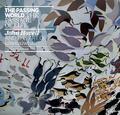
* Poetry: Kate Camp - The Mirror of Simple Annihilated Souls

* Fiction: Laurence Fearnley - The Hut Builder

Chris Bourke's Blue Smoke also won the people's choice award... and the Book of the Year (so he cleaned up, basically). Congrats to Chris!
The short-lists for each category can be found here.
As I post this, there haven't been any press releases on the winners (embargoed until 10pm I think), so I'm like, totally breaking news here for you non-Twitters. (The first book award winners were announced ages ago; press release here).
And now for the comment portion of this mini-post: Meh. It's late, I'm going to bed (before I say anything that I might regret; if not tomorrow, maybe zeg, or the day after zeg).
The other day I received an email from a friend currently teaching English in Georgia (the country in Eurasia rather than the US State) trying to introduce a Georgian word into English usage, at least amongst his circle of friends back here.
zeg = (n) day after tomorrow, in two days time.Its brevity appeals. I also rather like the sound of it. 'See you zeg.' Sounds kinda hepcat, kinda Brave New World.
In my brave new world of working Monday-Tuesday and writing full-time Wednesday-Sunday, I'm often losing track of which day of the week it is. So promising to check the oil and water zeg means I can gloss over the fact I can't remember if it's Thursday or Friday.
Bi-fold playlist for a week in which you doubt your own originality
Side A: Originals Whose Fame Has Been Surpassed By Covers
Torn – Ednaswap
Nothing Compares 2 U – The Family
Tainted Love – Gloria Jones
Mad World – Tears for Fears
Side B: Covers That Make Being Not Entirely Original Seem Cool
You'll Never Walk Alone – Gerry And The Pacemakers
It Ain't Me Babe - Jan and Dean
Throw Your Arms Around Me – Neil Finn
The Letter – Joe Cocker
Side C: Spotlight on Manfred Mann (& Manfred Mann's Earth Band)
Do Wah Diddy
Quinn The Eskimo
Blinded By The Light
For You
Side D: Hey Joe. Hey Joe? Hey Joe! Hey, Joe? Hey! Joe!
Hey Joe - The Byrds
Hey Joe - Patty Smith
Hey Joe - Brant Bjork
Hey Joe - Tim O'Brien
Kiwi As
 What's more New Zealand than a koru pattern in a mug of Milo?
What's more New Zealand than a koru pattern in a mug of Milo?(And yes, my desk is normally this messy)
2011 New Zealand Post Book Awards
Tonight the winners of the 2011 New Zealand Post Book Awards were announced. Thanks to the live tweeter from the NZ Book Council (@nzbookcouncil) I can tell you that winners in the four categories were:
* General non-fiction: Chris Bourke - Blue Smoke: The Lost Dawn of NZ Popular Music 1918-1964

* Illustrated non-fiction: Damian Skinner - The Passing World: The Passage of Life: John Hovell and the Art of Kowhaiwhai (also winner of most coloned title)

* Poetry: Kate Camp - The Mirror of Simple Annihilated Souls

* Fiction: Laurence Fearnley - The Hut Builder

Chris Bourke's Blue Smoke also won the people's choice award... and the Book of the Year (so he cleaned up, basically). Congrats to Chris!
The short-lists for each category can be found here.
As I post this, there haven't been any press releases on the winners (embargoed until 10pm I think), so I'm like, totally breaking news here for you non-Twitters. (The first book award winners were announced ages ago; press release here).
And now for the comment portion of this mini-post: Meh. It's late, I'm going to bed (before I say anything that I might regret; if not tomorrow, maybe zeg, or the day after zeg).
Published on July 27, 2011 02:36
July 21, 2011
National Poetry Day 2011
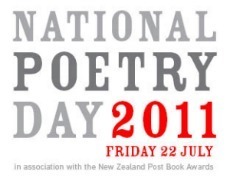 Today is National Poetry Day in Aotearoa / New Zealand. There are plenty of events on in towns around the country, but for those of you looking for an instant fix, here's a poem from me:
Today is National Poetry Day in Aotearoa / New Zealand. There are plenty of events on in towns around the country, but for those of you looking for an instant fix, here's a poem from me:---
The Sherlock Holmes of the Body
Eugen Sandow / Friederich Mueller (1867-1925)
He flexed on film for Thomas Edison
And wrote books with Conan Doyle
But it is in photographs,
Of which there are plenty,
That the shadow of Sandow is closest to
The man who willed himself into marble.
Take this one, from the Chicago World's Fair.
See him dusted with chalk, posing in a box
Lined with a coffin's black velvet,
Emulating Hercules or David or Samson
(the caption doesn't say),
In a cheetah print loin cloth.
How much like death these photos.
How much like myth
Or like perfection.
And like all myths, all deaths,
All flashes of perfection,
One cannot stare too long
the grain emerges
the backdrop sags
the moustache irks.
So let us flick through quickly
Then pull the shade on Eugen Sandow.
Give the marble god a chance to blink.
---
You can see Sandow posing on Edison's Kinescope strip from 1894 here.
I wrote the first (much longer) draft of this poem back in 2008 when I was working on a series of poems based on Vaudeville and freak show entertainers from the late nineteenth / early Twentieth Century. In researching Sandow, I learnt he toured New Zealand for six weeks in 1902-03. The man was a sensation long before the days of YouTube and his visit was built up to such an extent that one woman in Wellington was famously proclaimed: "Why, he's just a man!"
An early section of the novel I'm currently working focusses on the arrival of Harry Rickards' Vaudeville Company (also known as the Number 3 Company), of which Sandow was the headliner, to a small South Island town.
Published on July 21, 2011 06:01
July 20, 2011
Slightly Peculiar Love Stories
'...the story of love fulfilled is no story at all; it's in the gap between longing and completion that the narrative appears' -- Penelope Todd in the foreword to Slightly Peculiar Love Stories
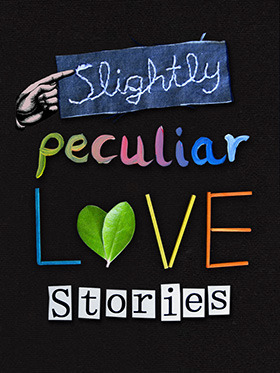
As of 5.30pm NZT yesterday, y'all can buy a copy of Slightly Peculiar Love Stories in your preferred eBook format from Rosa Mira Books.
SPLS features stories from 21 authors from New Zealand, Israel, the Philippines, the UK, the USA, Greece, Argentina, and Hong Kong, including Tania Hershman, Tim Jones, Tina Makereti, Maxine Alterio and Sue Wootton.
Oh, and me!
My story, 'Statues', was written specifically for the anthology and may be more than slightly peculiar (an Italian farmer falls in love with the statue in his town's piazza). I wrote about the inspiration behind the story on Rosa Mira's blog last month.

As of 5.30pm NZT yesterday, y'all can buy a copy of Slightly Peculiar Love Stories in your preferred eBook format from Rosa Mira Books.
SPLS features stories from 21 authors from New Zealand, Israel, the Philippines, the UK, the USA, Greece, Argentina, and Hong Kong, including Tania Hershman, Tim Jones, Tina Makereti, Maxine Alterio and Sue Wootton.
Oh, and me!
My story, 'Statues', was written specifically for the anthology and may be more than slightly peculiar (an Italian farmer falls in love with the statue in his town's piazza). I wrote about the inspiration behind the story on Rosa Mira's blog last month.
Published on July 20, 2011 15:02
July 18, 2011
All weeks are not created equal
Playlist for the week just been...
Nothing Ever Happens - Del Amitri
Nothing To Say - The Kinks
Nothing - Nada Surf (bonus points)
Nothing From Nothing - Billy Preston
William, It Was Really Nothing - The Smiths
Nothing Ever Happens Down Here - Gerry Rafferty
Nothing Ever Happens - Manfred Mann
Nothin' - Townes Van Zandt
Nothing Ever Happened - Deerhoof
And the song that was actually stuck in my head today but turns out doesn't have 'nothing' in the title:
Not all weeks are as interesting as the one described in my previous post. Take last week for example. No wildlife encounters or research expeditions outside the confines of my home office. No public appearances. No home videos worthy of posting on YouTube.
About all I can share is this link, which'll let you watch my panel discussion with Richard Glover, Brendan Cowell and Mark Dapin on 'bromance' from the Sydney Writers' Festival back in May. (I actually knew about this prior to my last post and could have included it in my interesting week rather than my uneventful week, but I forgot). Thanks to the ABC (Australia) for making this and a number of other interesting sessions from SWF2011 available online.
What else? Um, I went to an engagement party on Saturday and didn't know many people there. Word filtered back to me that someone was like, 'Where do I know the guy over there standing next to the girl in the red top from?' And one of the engagee was like, 'That's Craig Cliff, he's—', and the guy was like, 'The dude from the paper.' He was then too shy to turn around for the rest of the night. I guess that means I'm famous, right?
Of course, the great thing about boring, uneventful weeks is that there's plenty of time for writing. After a brief interlude in the present, I'm back in 1903. I should be finished with 1903 by the end of this week, then it's back-back to 1869, the year the Suez Canal opened and the tea clipper trade collapsed, before whizzing through to 1921 (or possibly 1919…).
Things will heat up again the end of August when I'm off to Going West Festival in Titirangi, then Melbourne Writers' Festival the next weekend. Not sure what I'm doing at Going West, but last I heard I was doing a reading with a bunch of other newer writers in Melbourne, then being on a panel called "New NZ Fiction" with Eleanor Catton. The festival programme may or may not read: "How do two of NZ's rising stars see the state of fiction in their country? Hear from award-winning writers Eleanor Catton and Craig Cliff as they discuss their books, and their relationship with fiction." Hmm, I think that calls for a reshuffle of the pile of books on my bedside cabinet.
The good news (in it's own strange way) is that I will still have the anticipation before reading Timequake for a couple more months...
[image error] Tim Doyle, Got to Be Kind
Nothing Ever Happens - Del Amitri
Nothing To Say - The Kinks
Nothing - Nada Surf (bonus points)
Nothing From Nothing - Billy Preston
William, It Was Really Nothing - The Smiths
Nothing Ever Happens Down Here - Gerry Rafferty
Nothing Ever Happens - Manfred Mann
Nothin' - Townes Van Zandt
Nothing Ever Happened - Deerhoof
And the song that was actually stuck in my head today but turns out doesn't have 'nothing' in the title:
Not all weeks are as interesting as the one described in my previous post. Take last week for example. No wildlife encounters or research expeditions outside the confines of my home office. No public appearances. No home videos worthy of posting on YouTube.
About all I can share is this link, which'll let you watch my panel discussion with Richard Glover, Brendan Cowell and Mark Dapin on 'bromance' from the Sydney Writers' Festival back in May. (I actually knew about this prior to my last post and could have included it in my interesting week rather than my uneventful week, but I forgot). Thanks to the ABC (Australia) for making this and a number of other interesting sessions from SWF2011 available online.
What else? Um, I went to an engagement party on Saturday and didn't know many people there. Word filtered back to me that someone was like, 'Where do I know the guy over there standing next to the girl in the red top from?' And one of the engagee was like, 'That's Craig Cliff, he's—', and the guy was like, 'The dude from the paper.' He was then too shy to turn around for the rest of the night. I guess that means I'm famous, right?
Of course, the great thing about boring, uneventful weeks is that there's plenty of time for writing. After a brief interlude in the present, I'm back in 1903. I should be finished with 1903 by the end of this week, then it's back-back to 1869, the year the Suez Canal opened and the tea clipper trade collapsed, before whizzing through to 1921 (or possibly 1919…).
Things will heat up again the end of August when I'm off to Going West Festival in Titirangi, then Melbourne Writers' Festival the next weekend. Not sure what I'm doing at Going West, but last I heard I was doing a reading with a bunch of other newer writers in Melbourne, then being on a panel called "New NZ Fiction" with Eleanor Catton. The festival programme may or may not read: "How do two of NZ's rising stars see the state of fiction in their country? Hear from award-winning writers Eleanor Catton and Craig Cliff as they discuss their books, and their relationship with fiction." Hmm, I think that calls for a reshuffle of the pile of books on my bedside cabinet.
The good news (in it's own strange way) is that I will still have the anticipation before reading Timequake for a couple more months...
[image error] Tim Doyle, Got to Be Kind
Published on July 18, 2011 00:12
July 11, 2011
The younger people with the ache of youth were eating all the cheese
The title of today's post is a line from 'Somewhere Else' by Grace Paley. The rest of this post is stuff I've been up to over the last week (and has nothing to do with cheese).
Kay One Double-Ewe One
On Tuesday evening I went to the Karori Wildlife Sanctuary (aka Zealandia) to observe a researcher recording kiwi calls for a Dom Post column I'm writing. It was the first time I've ever seen a kiwi without a pane of glass between us (I saw five; the closest was probably a forty centimetres from my foot). It was also the first time I've been called upon to use radio telemetry (I picked it up quickly, apparently). I will withhold my ra-ra 'the sanctuary is a precious asset' carry-on for Your Weekend in a little under three weeks.
Appetite for Deconstruction
On Thursday evening I graced the podium at the Brooklyn Masonic Lodge. Twas a strange old place, secluded up a winding drive, the main hall had a small square dance floor (3m x 3m maybe) in the centre for post-initiation jigs and burning Dan Brown books (I guess).
But no goats were slaughtered on Thursday. There weren't even any secret handshakes. No, I was there along with poet Jenny Bornholdt, children's writer Philippa Werry and TradeMe guru and columnist Mike O'Donnell to talk about "Appetites" (however we chose to take that theme) in a fundraising evening for Brooklyn School.
The event was chaired by Radio National's Kathryn Ryan (it was strange to hear her, let alone see hear, outside of the 9-noon window). There was mulled wine (it was a howling southerly), nibbles and a raffle (M. came along and won third prize: result!). Funds raised from the evening went toward buying books for the year ones and twos. Philippa Werry quoted Mario Vargas Llosa's Nobel acceptance speech where he said that learning to read was the most important thing that ever happened to him. True, true.
I spoke about my appetite for basketball, which was stoked by the rejection encountered as a third former (Year 9) when I didn't make one of my school's three basketball squads, and how this passion is essentially the same as my passion for writing (basketball as a 13-year-old involved a lot of making up stories on my driveway while I wore through another nylon net, with regular doses of rejection when ever I came too close to the real world). To frame this discussion I read from my story-in-progress (or story-for-which-progress-stalled-some-time-ago) 'The Wishing Cave', which I included in my Abandoned Blog Posts post last month.
Time's A Goon
On Friday I signed 1,020 stickers for the Commonwealth Foundation. The stickers will be stuck inside copies of A Man Melting (if they end up buying 1,020 that'll do wondrous things to my sales figures) for the head of the Commonwealth Foundation to give as gifts (along with 2011 Best Book winner, A Memory of Love) to ambassadors and other embassy-types.
[image error] [Aside: In an abandoned passage from an abandoned novel, I once wondered what if every reproduction of a famous painting, say Lady with an Ermine, was another pair of eyes for the original artwork, which by virtue of it being a masterpiece possessed a kind of sentience. What would Lady with an Ermine conclude about humanity from its 1,000 vantage points and four centuries of surveillance? How would this differ from The Madonna of The Rocks' views? I was reminded of this 'What If' when considering what sort of hands my book might end up as a result of this Commonwealth Foundation gifting. Wouldn't it be a funky art project to install tiny spycams in the spine of each book and watch the goings on in consulate drawing rooms (and oxfam second hand stores)? Yes, but unfortunately it'd also be considered espionage.]
My brother flexed his photograpic muscle and made this timelapse film of my 67 minute signing vigil (an average of one signature every 3.97 seconds), complete with tracking shots and sunset over the bays, Kilbirnie and Miramar.
[I'm having trouble embedding the video right now... you'll have to just click here]
I asked Damien Wilkins if we could use a song off The Close Readers' fabulous album, Group Hug. He replied: 'Another of my goals achieved: to be background music!' The song used is: 'What Did I Do Right?'. You can find out more about the Close Readers and buy their album here.
You know how sometimes your activities over a given period are coloured by the book you're reading at the time (and how the book is coloured by what's going on around you)? Well, the compression of 67 minutes of mindless, OOS-risking activity into a 1:17 timelapse seems to me emanently linked to the theme of A Visit From The Goon Squad by Jennifer Egan, which I blogged about yesterday.
Below Ground Above Karori

On Saturday I went on a tour of the Wrights Hill Fortress, which was built hastily during WWII when fears of a Japanese invasion were at their peak. The tour was a tie-in with Wayne Barrar's exhibition of underground photos from around the world, 'An Expanding Subterra' which is on at the Wellington City Gallery until this weekend. Barrar was there with his camera and tripod, but the tour was led by Mike Lee, the chairman of the society looking after and restoring the fortress.
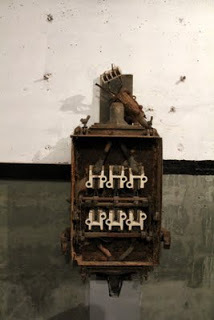
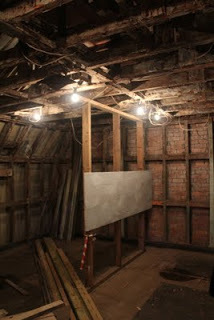
The complex is surprisingly huge. So huge that Lee and his dedicated team have only managed to restore one of the three gun placements (though no guns as they were sold as scrap to Japan (!!) in the 1960s) since 1989. We were also taken to the unrestored parts and the contrast was huge. I really hope that the unrestored parts remain that way. The wetas also seemed to prefer the decayed to the done-up.
If you're looking for better photography than my snapshots, you should check out my brother's new blog (he's good with the photoshop, not so much with the proof reading; when our powers combine, we are Captain Blogger).
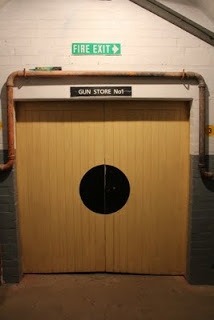
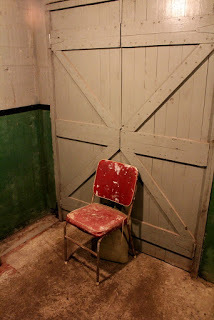
The Vestigial Ess
I'm not one of those editor-types who knows the hard and fast rules of grammar and keeps a copy of Strunk and White beside my PC. In musical terms, I learnt to write all proper-like by ear. As a result my foundations are always shifting. I go through phases with punctuation: at the moment I am emerging from a reliance on em-dashes (and finding room for parentheses); I once vowed never to use a semi-colon.
At the moment, without any scientific basis or proclamation from a higher authority, I find myself removing the terminal "s" from words such as "towards", "besides", and "backwards". This is a recent evolution of my move away from "whilst" to "while".
[Aside: There a dude who runs training courses at work who says "while-ist" which is incredibly distracting when you're trying ever-so-hard to focus on what's new in Microsoft Office 2007; it's also inefficient.]
The thing is, I still type "whilst" and "towards" most of the time and I'm trying to take note of what I actually say in conversation (unconcious usage being the self-taught grammarian's bible). But for now it's farewell to those superfluous susserations and hopefully hello to a cleaner, simpler voice on the page.
Helicopters
On Sunday I spoke with a helicopter pilot and the director of a helicopter training and tour operator at the Lifeflight offices by the airport (they run the Westpac Rescue Helicopter). I had questions to ask about choppers because I'm writing a story for The Griffith Review ("the leading Australian journal of ideas and analysis" according to their own press, but this accords with my knowledge, especially from my time in Australia 2004-2007) sort of on spec. They asked if I had something that fit the theme of their next issue, which is "islands". I said not really, but I have some unfinished pieces which I could scrub up. They liked the sound of my helicopter story and said I had till the end of July… which meant I needed to get my head around helicopters pronto.
The two guys I spoke to yesterday were generous with their time and most helpful (one even offered to read through what I write, though I'm not sure I'm up for that kind of technical scrutiny). This week I'm going to devote my AMs to chugging on with the novel (Parenthetical Progress Report: going pretty well right now, maybe 15% done with 3.5 months of amazing productivity ahead of me, hohoho) and churning out my chopper story in the PM.
Country and Western (Poetry)
Today (Monday) I walked to Te Papa in my lunch hour (it was surprisingly dry and unblustery) to listen to Jenny Bornholdt, Airini Beautrais and Bernadette Hall read and discuss their latest poetry collections, chaired by Bill Manhire. It was the first of twelve Writers on Mondays sessions for the year and I hope to make it along to all that I can.
I've been meaning to do a poetry collection / anthology reading summary post since February... It's been so long that I've read two Airini Beautrais collections in that time (Secret Heart and Western Line) and haven't yet raved about them (though I did mention her in my interview on Unity Books' website).
The reading today was a bit, I dunno... umph-less. I'm not sure the experiement to have the other two poets comment on their favourite poems in the collection of the poet who just read worked. There didn't seem much scope for conflict or discussion.
It may have been the audience (and/or the lack of mulled wine), but I felt like Jenny Bornholdt got a lot more laughs on Thursday night; and I was expecting Airini Beatrais' charms and curses from Western Line to kill.
(When I read these poems, I tend to hear Kim Hill's voice rather than Airini's [Radio NZ interview here]; maybe the audience felt similarly confused).
Not a wasted lunchtime venture by any stretch, but something a little short of magic.
Trailing Off
Tomorrow I'm on the 6.30am flight to Auckland for work... School visits: yay! Early start: boo!
Kay One Double-Ewe One
On Tuesday evening I went to the Karori Wildlife Sanctuary (aka Zealandia) to observe a researcher recording kiwi calls for a Dom Post column I'm writing. It was the first time I've ever seen a kiwi without a pane of glass between us (I saw five; the closest was probably a forty centimetres from my foot). It was also the first time I've been called upon to use radio telemetry (I picked it up quickly, apparently). I will withhold my ra-ra 'the sanctuary is a precious asset' carry-on for Your Weekend in a little under three weeks.
Appetite for Deconstruction
On Thursday evening I graced the podium at the Brooklyn Masonic Lodge. Twas a strange old place, secluded up a winding drive, the main hall had a small square dance floor (3m x 3m maybe) in the centre for post-initiation jigs and burning Dan Brown books (I guess).
But no goats were slaughtered on Thursday. There weren't even any secret handshakes. No, I was there along with poet Jenny Bornholdt, children's writer Philippa Werry and TradeMe guru and columnist Mike O'Donnell to talk about "Appetites" (however we chose to take that theme) in a fundraising evening for Brooklyn School.
The event was chaired by Radio National's Kathryn Ryan (it was strange to hear her, let alone see hear, outside of the 9-noon window). There was mulled wine (it was a howling southerly), nibbles and a raffle (M. came along and won third prize: result!). Funds raised from the evening went toward buying books for the year ones and twos. Philippa Werry quoted Mario Vargas Llosa's Nobel acceptance speech where he said that learning to read was the most important thing that ever happened to him. True, true.
I spoke about my appetite for basketball, which was stoked by the rejection encountered as a third former (Year 9) when I didn't make one of my school's three basketball squads, and how this passion is essentially the same as my passion for writing (basketball as a 13-year-old involved a lot of making up stories on my driveway while I wore through another nylon net, with regular doses of rejection when ever I came too close to the real world). To frame this discussion I read from my story-in-progress (or story-for-which-progress-stalled-some-time-ago) 'The Wishing Cave', which I included in my Abandoned Blog Posts post last month.
Time's A Goon
On Friday I signed 1,020 stickers for the Commonwealth Foundation. The stickers will be stuck inside copies of A Man Melting (if they end up buying 1,020 that'll do wondrous things to my sales figures) for the head of the Commonwealth Foundation to give as gifts (along with 2011 Best Book winner, A Memory of Love) to ambassadors and other embassy-types.
[image error] [Aside: In an abandoned passage from an abandoned novel, I once wondered what if every reproduction of a famous painting, say Lady with an Ermine, was another pair of eyes for the original artwork, which by virtue of it being a masterpiece possessed a kind of sentience. What would Lady with an Ermine conclude about humanity from its 1,000 vantage points and four centuries of surveillance? How would this differ from The Madonna of The Rocks' views? I was reminded of this 'What If' when considering what sort of hands my book might end up as a result of this Commonwealth Foundation gifting. Wouldn't it be a funky art project to install tiny spycams in the spine of each book and watch the goings on in consulate drawing rooms (and oxfam second hand stores)? Yes, but unfortunately it'd also be considered espionage.]
My brother flexed his photograpic muscle and made this timelapse film of my 67 minute signing vigil (an average of one signature every 3.97 seconds), complete with tracking shots and sunset over the bays, Kilbirnie and Miramar.
[I'm having trouble embedding the video right now... you'll have to just click here]
I asked Damien Wilkins if we could use a song off The Close Readers' fabulous album, Group Hug. He replied: 'Another of my goals achieved: to be background music!' The song used is: 'What Did I Do Right?'. You can find out more about the Close Readers and buy their album here.
You know how sometimes your activities over a given period are coloured by the book you're reading at the time (and how the book is coloured by what's going on around you)? Well, the compression of 67 minutes of mindless, OOS-risking activity into a 1:17 timelapse seems to me emanently linked to the theme of A Visit From The Goon Squad by Jennifer Egan, which I blogged about yesterday.
Below Ground Above Karori

On Saturday I went on a tour of the Wrights Hill Fortress, which was built hastily during WWII when fears of a Japanese invasion were at their peak. The tour was a tie-in with Wayne Barrar's exhibition of underground photos from around the world, 'An Expanding Subterra' which is on at the Wellington City Gallery until this weekend. Barrar was there with his camera and tripod, but the tour was led by Mike Lee, the chairman of the society looking after and restoring the fortress.


The complex is surprisingly huge. So huge that Lee and his dedicated team have only managed to restore one of the three gun placements (though no guns as they were sold as scrap to Japan (!!) in the 1960s) since 1989. We were also taken to the unrestored parts and the contrast was huge. I really hope that the unrestored parts remain that way. The wetas also seemed to prefer the decayed to the done-up.
If you're looking for better photography than my snapshots, you should check out my brother's new blog (he's good with the photoshop, not so much with the proof reading; when our powers combine, we are Captain Blogger).


The Vestigial Ess
I'm not one of those editor-types who knows the hard and fast rules of grammar and keeps a copy of Strunk and White beside my PC. In musical terms, I learnt to write all proper-like by ear. As a result my foundations are always shifting. I go through phases with punctuation: at the moment I am emerging from a reliance on em-dashes (and finding room for parentheses); I once vowed never to use a semi-colon.
At the moment, without any scientific basis or proclamation from a higher authority, I find myself removing the terminal "s" from words such as "towards", "besides", and "backwards". This is a recent evolution of my move away from "whilst" to "while".
[Aside: There a dude who runs training courses at work who says "while-ist" which is incredibly distracting when you're trying ever-so-hard to focus on what's new in Microsoft Office 2007; it's also inefficient.]
The thing is, I still type "whilst" and "towards" most of the time and I'm trying to take note of what I actually say in conversation (unconcious usage being the self-taught grammarian's bible). But for now it's farewell to those superfluous susserations and hopefully hello to a cleaner, simpler voice on the page.
Helicopters
On Sunday I spoke with a helicopter pilot and the director of a helicopter training and tour operator at the Lifeflight offices by the airport (they run the Westpac Rescue Helicopter). I had questions to ask about choppers because I'm writing a story for The Griffith Review ("the leading Australian journal of ideas and analysis" according to their own press, but this accords with my knowledge, especially from my time in Australia 2004-2007) sort of on spec. They asked if I had something that fit the theme of their next issue, which is "islands". I said not really, but I have some unfinished pieces which I could scrub up. They liked the sound of my helicopter story and said I had till the end of July… which meant I needed to get my head around helicopters pronto.
The two guys I spoke to yesterday were generous with their time and most helpful (one even offered to read through what I write, though I'm not sure I'm up for that kind of technical scrutiny). This week I'm going to devote my AMs to chugging on with the novel (Parenthetical Progress Report: going pretty well right now, maybe 15% done with 3.5 months of amazing productivity ahead of me, hohoho) and churning out my chopper story in the PM.
Country and Western (Poetry)
Today (Monday) I walked to Te Papa in my lunch hour (it was surprisingly dry and unblustery) to listen to Jenny Bornholdt, Airini Beautrais and Bernadette Hall read and discuss their latest poetry collections, chaired by Bill Manhire. It was the first of twelve Writers on Mondays sessions for the year and I hope to make it along to all that I can.
I've been meaning to do a poetry collection / anthology reading summary post since February... It's been so long that I've read two Airini Beautrais collections in that time (Secret Heart and Western Line) and haven't yet raved about them (though I did mention her in my interview on Unity Books' website).
The reading today was a bit, I dunno... umph-less. I'm not sure the experiement to have the other two poets comment on their favourite poems in the collection of the poet who just read worked. There didn't seem much scope for conflict or discussion.
It may have been the audience (and/or the lack of mulled wine), but I felt like Jenny Bornholdt got a lot more laughs on Thursday night; and I was expecting Airini Beatrais' charms and curses from Western Line to kill.
(When I read these poems, I tend to hear Kim Hill's voice rather than Airini's [Radio NZ interview here]; maybe the audience felt similarly confused).
Not a wasted lunchtime venture by any stretch, but something a little short of magic.
Trailing Off
Tomorrow I'm on the 6.30am flight to Auckland for work... School visits: yay! Early start: boo!
Published on July 11, 2011 02:56
July 9, 2011
Finally, A Visit From The Goon Squad
 A Visit From The Goon Squad by Jennifer Egan
A Visit From The Goon Squad by Jennifer EganThis was a book I have been meaning to read for the last twelve months, ever since it started getting reviewed in the U.S. (e.g. this rave from the NY Times from July '10), but then I had to wait for it to arrive in New Zealand and other books leap-frogged it in my reading queue.
Reason for my interest #1: In my bottom drawer I have an unpublished quasi-satirical rock'n'roll novel (which doubled as my MA thesis).
Reason for my interest #2: Structure. The book is basically 14 loosely linked chapters focussing of different characters, none of which would really stand up too well as a traditional short story. The chapters deal with different times (from the 1970's to 2020's, but not necessarily chronologically), different places (mostly the US, but also an African safari and Naples) and employ different narrative approaches (first, second and third person narrators; faux-journalism; a girl's diary in powerpoint slides). How does something like this work? And why would something like this be attempted?
I now have some answers.
One could say the hub of the vortex of voices in the novel is Bennie Salazar, who we see at various points as an aloof boss, a struggling father post-divorce, a struggling husband pre-divorce, a teenage rocker, a hot ticket in the music industry and a pariah of the same industry years later.
Or perhaps his one-time assistant, Sasha is the hub (she gets centre stage in the opening chapter and her whereabouts drives the action of the novels final paragraphs, though the reader knows where she is from the preceding chapter).
Or perhaps there are two hubs, Bennie and Sasha, which seems perfectly reasonably.
But the true locus of the novel is its obsession with time. As one of the characters says, "Time's a goon, right? You gonna let that goon push you around?" (Hence the title). The novel evokes an almost Proustian dread at the passing of time; the fact that things change so suddenly and arbitrarily, that security and succour aren't necessarily the recipe for happiness. No one character can be central in a book about the dispassionate river of time.
A Visit From The Goon Squad is about connections and disconnections, and the diffuse structure and disjointed narrative are how this is conveyed. Setting it in and around the music industry, which has always been fickle but over the last twenty years has seen drastic changes on the corporate side, the distribution and consumption of music, is genius.
I enjoyed touching down at various points in music history, be it the days of San Francisco hardcore in the 1980s (Dead Kennedys, Flipper et al), grunge (Bennie Salazar's big find, the fictional band The Conduits, were probably part of this wave in the 90's) and the near future where 'pointers' (pre-verbal children) buy music via handheld devices and drive the industry towards simplified songs.
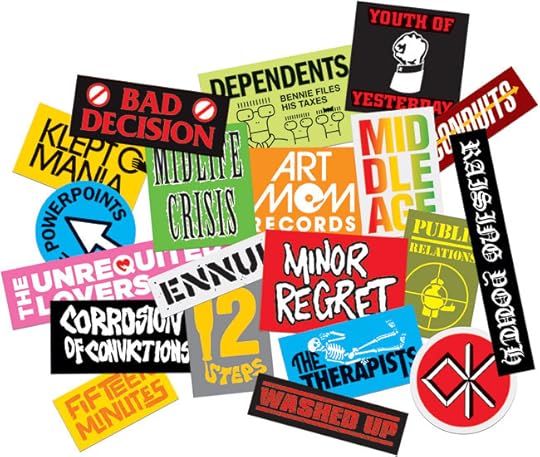 This image from the NY Times Review from July 2010 is a better representation of the novel than any plot summary.
This image from the NY Times Review from July 2010 is a better representation of the novel than any plot summary.By the time I closed the book I had an appreciation for it, a respect even, and suspect it may creep onto my top ten list for books I've read this year...
But it was a book I hated at several points.
I hated the first chapter, where Sasha is lying on her shrink's couch and recounting her latest bout of kleptomania, which occurred on a first date with Alex (who will not feature in the book again till the final chapter, and even then he'll struggle for pages to remember her name and if they slept together or not). The reader is held at one remove from the action (we keep getting pulled back to the shrink's couch when we want to be there on that date) and it was a feeling that was kicked up several times throughout the book.
I hated the section told in the second person, because I hate everything written in the second person. Rather than pulling me closer to the story because it is about me (You do this, you do that) it re-enforces my distance from the narrative. Because no, my name is not Rob, I have not recently slashed my wrists with a box cutter and I never had sex with a football teammate in my car. Why was this chapter in the second person? Because there had to be a second person chapter in such a grab-bag novel. It just felt so mechanical, and cynical. But this is probably me reading with a writer's eyes, and is therefore this is invalid.
I hated some other, smaller moments like the unconvincing Scotty Hausmann concert in the final chapter which is supposed to come off as revelatory and uplifting but the reader is not given enough of a taste of the music or the moment to be impacted in any way beyond the native adrenalie we all feel when there are only a couple of pages of a book remaining.
But as I say, I appreciate the book now. Perhaps a second re-reading will iron out any of these wrinkles because I'll know that the contraption called A Visit From The Goon Squad is not interested in individual lives, not Bennie, not Sasha, not you/Rob, not Scotty Hausmann, because time doesn't care about them. (Hence the distancing techniques: Oh, I know you want to get close to Sasha, get inside her head and follow her for the next 200 pages, but that ain't the game we're playing). And yet, as we see in the best chapters, there are ways to wrestle meaning from the abyss.
Such as the chapter told entirely with powerpoint slides. This may surprise some after my allergic reaction to the gimmickry of second person narration (but note: I've prepared a fair few powerpoints in my time in the public service). These slides, compiled by Sasha's daughter and telling, in their own way, the story of her autistic brother's obsession with pauses in rock songs, speak simply to the questions at the heart of the novel. How did we get here? Where are we going? The song pauses are false endings, reminders of mortality but also a temporary retrieve from it; a high concept metaphor which is made to work in the low concept powerpoint presentation. The drama in this chapter is ripe with the fact that parents were once children, and children will become parents. The family live on the edge of a desert that used to be lawns and parks and golf courses, and is now dominated by a forest of solar panels that must even capture the moonlight to power the powerpoint presentations of the world.
A Visit From The Goon Squad takes risks, tackles the big questions, has its successes and it failures. I do not think it is a great book. Yet.
Published on July 09, 2011 21:55
June 30, 2011
Bits of Babel, Books, Birds, Base/Bass & Basketball (#94)
Babel Building Blocks
The writer Isaac Babel is said to have asked women he met if he might rifle through their purses to inspect their contents. Some accounts have him paying for this privilege, fewer still suggest that he paid prostitutes for this (and this alone).
_
"A well-thought-out story doesn't need to resemble real life. Life itself tries with all its might to resemble a well-crafted story."
— Isaac Babel ('My First Fee')
_
"How late I learned the essential things in life! In my childhood, nailed to the Gemara, I led the life of a sage, and it was only later, when I was older, that I began to climb trees"
— Isaac Babel
_
"I grew up wishing that someday, somewhere, a door would open and my father would come in. We would recognize each other immediately, and without seeming surprised, without letting him catch his breath, I would say: "Well, here you are at last. We've been puzzled about you for so long; although you left behind much love and devotion, you bequeathed to us very few facts. It's so good to have you here. Do sit down and tell us what happened."
— Nathalie Babel (Isaac's daughter, quoted here)
*
Anniversaries
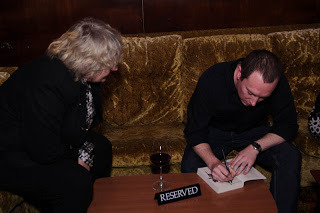 Today marks one year since the book launch for A Man Melting (and one year and one day since getting engaged; still a few months to go before November!!). The book was officially released on 2 July 2010...
Today marks one year since the book launch for A Man Melting (and one year and one day since getting engaged; still a few months to go before November!!). The book was officially released on 2 July 2010...
I'm working like stink to get a book together that might be able to come out in the second half of 2012, but there are a lot of things outta my control (and even the things that are in my control I might not be able to manage), so for now it'll do to look back on my first launch and the solid twelve months me and A Man Melting have had, including: 10 positive reviews (0 negative), 2 end-of-year best book lists, 1 "hot writer" appellation, 1 "best dressed", 3 appearances on radio NZ, two appearances on TV, a prize, a number of newspaper articles about me, 21 columns published in the Dom Post, 1 travel article published and 1 fiction review submitted and set to appear shortly.
*
And 1
And it's nice (in a strange way) to have my words being picked up and mangled by spammers. Here's the latest:
"She was only a newcomer (her solo moody was 4 years later) and described herself as 'a pouch of potatoes'"- misquoted here, original here.
*
The word and the image
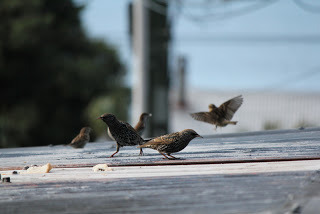
I only started noticing starlings after reading Tim Upperton's poem, 'The Starlings', two years ago. Until then, I guess I didn't bother to distinguish them from blackbirds and thrushes, despite the fact this now seems ludicrous: the metallic glints of their feathers, their electro-squeals, the packs picking through seaweed or muscling out sparrow and chaffinch on the freshly sown lawn, even their silhouette (short tail, thin beak) - how could it be anything but a starling?
The pursuit of knowledge is like the starlings' drive to reproduce in Upperton's poem: never-ending and perhaps even pointless. But once you start, it's harder to derail a certain fascination.
It wasn't until this year that I took note of the difference between a summer starling and a winter starling. And it's all thanks to my new Canon 550D and its image stabilised 55-250mm lens which allows me to get close-ups of birds and capture them in motion while still keeping the images clear. Before this starts sounding like an infomercial... it's time for pictorial illustration.
Because I only got my camera a couple of months ago, I don't have any summer starling photos, but here's a nice illustration courtesy of http://www.g1art.com:
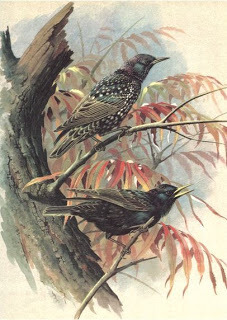 Winter starling (top) and summer starling (bottom)In winter, a starling's plumage gets all spotty and they look a lot more sinister, to me at least. I think the sinisterness (?) is directly proportional to the starling's immediate environs...
Winter starling (top) and summer starling (bottom)In winter, a starling's plumage gets all spotty and they look a lot more sinister, to me at least. I think the sinisterness (?) is directly proportional to the starling's immediate environs...
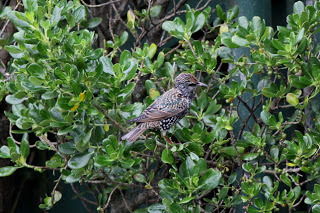 In a tree: moderately sinister.
In a tree: moderately sinister.
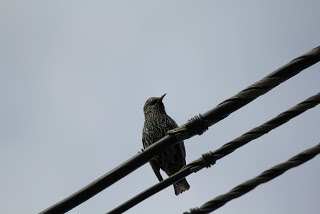 Peering down from a powerline: quite sinister.
Peering down from a powerline: quite sinister.
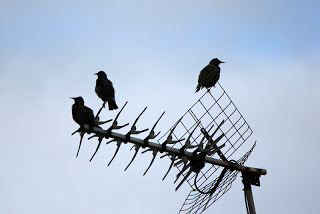 3 puffed up brutes keeping lookout from a Sky aerial: highly sinister
3 puffed up brutes keeping lookout from a Sky aerial: highly sinister
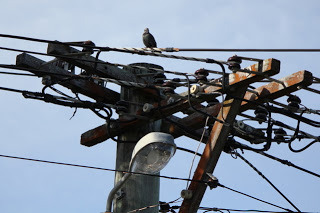 Controlling the national grid: terrifying!
Controlling the national grid: terrifying!
Okay, I know I've already lost most of you, but does anyone else think a starling in winter looks like a dalek?
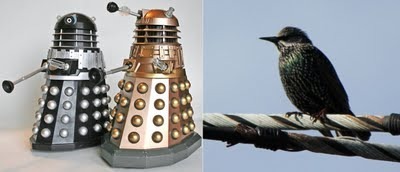
Am I right? Fine, next topic...
*
I like you're old stuff better than your knew stuff
When I lived in the UK I really enjoyed watching Masterchef, which was a 30 minute show every weeknight which pitch 6 amateur chefs against each other. Every episode there were 3 challenges and one person left standing at the end of the episode. Then it was quarterfinals, semis and a week long final where the final few went of the the jungle or something.
Now of course every country has their bastardised Masterchef - none of which I can stomach. The Australian one, which runs before the TV1 news here in NZ (so I am destined to catch the last 2mins of every episode) is the worst. At the moment they are working their way through the top 50, kicking out people every two challenges. On average it seems to take 1.5 episodes to finish one challenge (and these are 60 minute episodes). And the challenges seem to mostly be them all cooking the same freaking dish! No thank you.
So I was delighted to see this video on YouTube (via Twitter) today that took me back to the good old days old Greg and John on the original Masterchef:
*
Locked Out
The NBA has officially locked out its players as negotiations for a new collective bargaining agreement with the players union have stalled. NBA.com has also gone into lock down mode. It's looking like some or all of the 2011-12 NBA season will be lost. The last time a labour dispute affected a season was back in 1999, when they managed to come to an agreement in December and held a 50 game regular season (as opposed to the standard 82).
The maths is simple for most: a full season > a partial seasons > no season at all. Sadly, most might not include the owners (several of whom are losing money, so no season means less loss) and some of the players. But sucks for the fans.
It especially sucks for Sacramento Kings fans (like me), after the Californian capital managed to keep its franchise for one more season, but needs to increase attendance and get a deal for a new arena done in order to insure the long term viability of an NBA team in Sacto. Add to this the fact that in the last week the team has acquired three new potential starters: Jimmer Fredette (#10 pick in the 2011 draft and the latest great white hope), John Salmons (via a trade with the Milwaukee Bucks) and JJ Hickson (via a trade with the Cleveland Cavs). And the Kings probably aren't done revamping their roster. Whenever the lockout ends and free agent signings can commence, they should be targetting another big man from Nene, Tyson Chandler, Marc Gasol, or resigning Samuel Dalembert.
I was talking to a friend the other day who said he just can't get into basketball because to him the game seems relatively static and repetitive. I can totally see this, but once you buy in to the narrative of American sports (in which statistics and economics play major parts) it's difficult to disentangle oneself. There's always some drama going on, most of it off the court, or between possessions. The loss of an entire season does toss a wrench or two into the machine (how will the draft order be determined if no season took place? what happens to players in the final year of their contract who don't get a chance to play their butts off in 2011-12 to earn their big payday?) but it also threatens to break that narrative thread. The NBA could lose a lot of fans in the next 12 months as people find new time sponges. I know I'll certainly notice the extra 2.5 hours 3 times a week that'll free up with no Kings games to watch on NBA league pass. Will it make me more prolific? Meh, I'll probably just play angry birds.
But, while there's still some Kings news to report, I'll just wish Omri Casspi well with the Cavs. If only you were as devastating in purple as advertised!!

The writer Isaac Babel is said to have asked women he met if he might rifle through their purses to inspect their contents. Some accounts have him paying for this privilege, fewer still suggest that he paid prostitutes for this (and this alone).
_
"A well-thought-out story doesn't need to resemble real life. Life itself tries with all its might to resemble a well-crafted story."
— Isaac Babel ('My First Fee')
_
"How late I learned the essential things in life! In my childhood, nailed to the Gemara, I led the life of a sage, and it was only later, when I was older, that I began to climb trees"
— Isaac Babel
_
"I grew up wishing that someday, somewhere, a door would open and my father would come in. We would recognize each other immediately, and without seeming surprised, without letting him catch his breath, I would say: "Well, here you are at last. We've been puzzled about you for so long; although you left behind much love and devotion, you bequeathed to us very few facts. It's so good to have you here. Do sit down and tell us what happened."
— Nathalie Babel (Isaac's daughter, quoted here)
*
Anniversaries
 Today marks one year since the book launch for A Man Melting (and one year and one day since getting engaged; still a few months to go before November!!). The book was officially released on 2 July 2010...
Today marks one year since the book launch for A Man Melting (and one year and one day since getting engaged; still a few months to go before November!!). The book was officially released on 2 July 2010...I'm working like stink to get a book together that might be able to come out in the second half of 2012, but there are a lot of things outta my control (and even the things that are in my control I might not be able to manage), so for now it'll do to look back on my first launch and the solid twelve months me and A Man Melting have had, including: 10 positive reviews (0 negative), 2 end-of-year best book lists, 1 "hot writer" appellation, 1 "best dressed", 3 appearances on radio NZ, two appearances on TV, a prize, a number of newspaper articles about me, 21 columns published in the Dom Post, 1 travel article published and 1 fiction review submitted and set to appear shortly.
*
And 1
And it's nice (in a strange way) to have my words being picked up and mangled by spammers. Here's the latest:
"She was only a newcomer (her solo moody was 4 years later) and described herself as 'a pouch of potatoes'"- misquoted here, original here.
*
The word and the image
a little thing, made big from not knowing when to leave off:
gone past all need except need, enough never enough.

I only started noticing starlings after reading Tim Upperton's poem, 'The Starlings', two years ago. Until then, I guess I didn't bother to distinguish them from blackbirds and thrushes, despite the fact this now seems ludicrous: the metallic glints of their feathers, their electro-squeals, the packs picking through seaweed or muscling out sparrow and chaffinch on the freshly sown lawn, even their silhouette (short tail, thin beak) - how could it be anything but a starling?
The pursuit of knowledge is like the starlings' drive to reproduce in Upperton's poem: never-ending and perhaps even pointless. But once you start, it's harder to derail a certain fascination.
It wasn't until this year that I took note of the difference between a summer starling and a winter starling. And it's all thanks to my new Canon 550D and its image stabilised 55-250mm lens which allows me to get close-ups of birds and capture them in motion while still keeping the images clear. Before this starts sounding like an infomercial... it's time for pictorial illustration.
Because I only got my camera a couple of months ago, I don't have any summer starling photos, but here's a nice illustration courtesy of http://www.g1art.com:
 Winter starling (top) and summer starling (bottom)In winter, a starling's plumage gets all spotty and they look a lot more sinister, to me at least. I think the sinisterness (?) is directly proportional to the starling's immediate environs...
Winter starling (top) and summer starling (bottom)In winter, a starling's plumage gets all spotty and they look a lot more sinister, to me at least. I think the sinisterness (?) is directly proportional to the starling's immediate environs... In a tree: moderately sinister.
In a tree: moderately sinister.
 Peering down from a powerline: quite sinister.
Peering down from a powerline: quite sinister. 3 puffed up brutes keeping lookout from a Sky aerial: highly sinister
3 puffed up brutes keeping lookout from a Sky aerial: highly sinister
 Controlling the national grid: terrifying!
Controlling the national grid: terrifying!Okay, I know I've already lost most of you, but does anyone else think a starling in winter looks like a dalek?

Am I right? Fine, next topic...
*
I like you're old stuff better than your knew stuff
When I lived in the UK I really enjoyed watching Masterchef, which was a 30 minute show every weeknight which pitch 6 amateur chefs against each other. Every episode there were 3 challenges and one person left standing at the end of the episode. Then it was quarterfinals, semis and a week long final where the final few went of the the jungle or something.
Now of course every country has their bastardised Masterchef - none of which I can stomach. The Australian one, which runs before the TV1 news here in NZ (so I am destined to catch the last 2mins of every episode) is the worst. At the moment they are working their way through the top 50, kicking out people every two challenges. On average it seems to take 1.5 episodes to finish one challenge (and these are 60 minute episodes). And the challenges seem to mostly be them all cooking the same freaking dish! No thank you.
So I was delighted to see this video on YouTube (via Twitter) today that took me back to the good old days old Greg and John on the original Masterchef:
*
Locked Out
The NBA has officially locked out its players as negotiations for a new collective bargaining agreement with the players union have stalled. NBA.com has also gone into lock down mode. It's looking like some or all of the 2011-12 NBA season will be lost. The last time a labour dispute affected a season was back in 1999, when they managed to come to an agreement in December and held a 50 game regular season (as opposed to the standard 82).
The maths is simple for most: a full season > a partial seasons > no season at all. Sadly, most might not include the owners (several of whom are losing money, so no season means less loss) and some of the players. But sucks for the fans.
It especially sucks for Sacramento Kings fans (like me), after the Californian capital managed to keep its franchise for one more season, but needs to increase attendance and get a deal for a new arena done in order to insure the long term viability of an NBA team in Sacto. Add to this the fact that in the last week the team has acquired three new potential starters: Jimmer Fredette (#10 pick in the 2011 draft and the latest great white hope), John Salmons (via a trade with the Milwaukee Bucks) and JJ Hickson (via a trade with the Cleveland Cavs). And the Kings probably aren't done revamping their roster. Whenever the lockout ends and free agent signings can commence, they should be targetting another big man from Nene, Tyson Chandler, Marc Gasol, or resigning Samuel Dalembert.
I was talking to a friend the other day who said he just can't get into basketball because to him the game seems relatively static and repetitive. I can totally see this, but once you buy in to the narrative of American sports (in which statistics and economics play major parts) it's difficult to disentangle oneself. There's always some drama going on, most of it off the court, or between possessions. The loss of an entire season does toss a wrench or two into the machine (how will the draft order be determined if no season took place? what happens to players in the final year of their contract who don't get a chance to play their butts off in 2011-12 to earn their big payday?) but it also threatens to break that narrative thread. The NBA could lose a lot of fans in the next 12 months as people find new time sponges. I know I'll certainly notice the extra 2.5 hours 3 times a week that'll free up with no Kings games to watch on NBA league pass. Will it make me more prolific? Meh, I'll probably just play angry birds.
But, while there's still some Kings news to report, I'll just wish Omri Casspi well with the Cavs. If only you were as devastating in purple as advertised!!
Published on June 30, 2011 21:45



